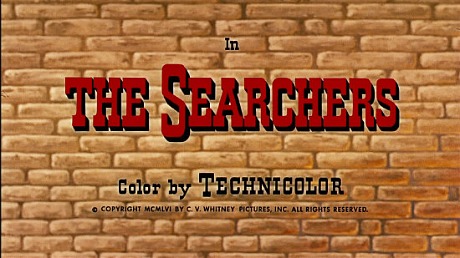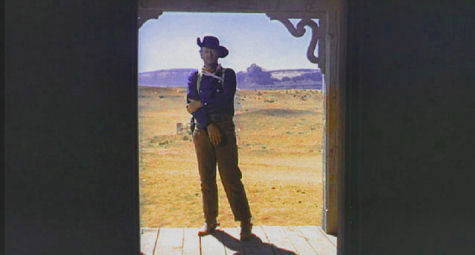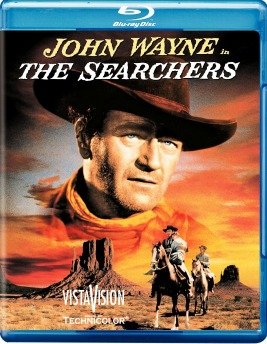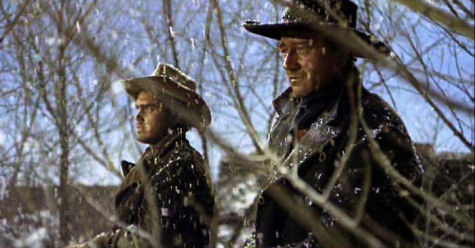I feel nothing but admiration and affection for Peter Bogdanovich, and I’ve been enjoying his Indiewire “Blogdanovich” columns all along. But his 8.9 praise piece about John Ford‘s The Searchers doesn’t feel especially fresh and in fact has a tired pulse. Bogdanovich is a Ford scholar par excellence, of course, but we’ve been hearing this same old stuff about The Searchers for decades (“not only among the very best, but also among the final Western masterworks of the movies’ golden age”). So why re-state it?

The first significant “take a fresh look at The Searchers” piece was written 32 years ago by New York contributor Stuart Byron. In it he called Ford’s 1956 film the “Super-Cult Movie of the New Hollywood.” And here we still are in the Age of Withered Obama, and The Searchers Bluray is a ripe and luscious thing to have and hold. We get it, we get it. Or I certainly do.
Here’s a counter-punch piece I posted a little more than five years ago:
“John Ford‘s movies have been wowing and infuriating me all my life. A first-rate visual composer and one of Hollywood’s most economical story-tellers bar none, Ford made films that were always rich with complexity, understatements and undercurrents that refused to run in one simple direction.
“Ford’s films are always what they seem to be…until you watch them again and re-reflect, and then they always seem to be about something more.
“But the phoniness and jacked-up sentiment in just about every one of them can be oppressive, and the older Ford got the more he ladled it on.
“The Irish clannishness, the tributes to boozy male camaraderie, the relentless balladeering over the opening credits of 90% of his films, the old-school chauvinism, the racism, the thinly sketched women, the “gallery of supporting players bristling with tedious eccentricity” (as critic David Thomson put it in his Biographical Dictionary of Film) and so on.

The closing shot of John Ford’s The Searchers
“The treacliness is there but tolerable in Ford’s fine pre-1945 work — The Informer, Stagecoach, Young Mr. Lincoln , Drums Along the Mohawk, They Were Expendable , The Grapes of Wrath and My Darling Clementine .
“But it gets really thick starting with 1948’s Fort Apache and by the time you get to The Searchers, Ford’s undisputed masterpiece that came out in March of 1956, it’s enough to make you yank the reins and go ‘whoa, nelly.’
“Watch the breathtaking beautiful new DVD of The Searchers, and see if you can get through it without choking. Every shot is a visual jewel, but except for John Wayne‘s Ethan Edwards, one of the most fascinating racist bastards of all time, every last character and just about every line in the film feels labored and ungenuine.
“The phoniness gets so pernicious after a while that it seems to nudge this admittedly spellbinding film toward self-parody. Younger people who don’t “get” Ford (and every now and then I think I may be turning into one) have been known to laugh at it.
“Jeffrey Hunter‘s Martin Pawley does nothing but bug his eyes, overact and say stupid exasperating lines all through the damn thing. Nearly every male supporting character in the film does the same. No one has it in them to hold back or play it cool — everyone blurts.
“Ken Curtis‘s Charlie McCorry, Harry Carey Jr.’s Brad Jorgensen, Hank Worden‘s Mose Harper…characters I’ve come to despise.

“I’ll always love the way Ford handles that brief bit when Ward Bond‘s Reverend Clayton sees Martha, the wife of Ethan’s brother, stroking Ethan’s overcoat and then barely reacts — perfect — but every time Bond opens his mouth to say something, he bellows like a bull moose.
“You can do little else but sit and grimace through Natalie Wood‘s acting as Debbie (the kidnapped daughter of Ethan’s dead brother), Vera Miles‘ Laurie Jorgenson, and Beulah Archuletta‘s chubby Indian squaw (i.e., “Wild Goose Flying in the Night Sky”)…utterly fake in each and every gesture and utterance.
“I realize there’s a powerful double-track element in the racism that seethes inside Ethan, but until he made Cheyenne Autumn Ford always portrayed Indians — Native Americans — as creepy, vaguely sadistic oddballs. The German-born, blue-eyed Henry Brandon as Scar, the Comanche baddie at the heart of The Searchers…’nuff said.
“That repulsive scene when Ethan and Martin look at four or five babbling Anglo women whose condition was caused, we’re informed, by having been raised by Indians, and some guy says, “Hard to believe they’re white” and Ethan says, “They ain’t white!”
“I don’t know how to enjoy The Searchers any more except by wearing aesthetic blinders — by ignoring all the stuff that drives me up the wall in order to savor the beautiful heartbreaking stuff (the opening and closing shot, Wayne’s look of fear when he senses danger for his brother’s family, his picking up Wood at the finale and saying, ‘Let’s go home, Debbie’).
“All I’m saying is, for a great film it takes an awful lot of work to get through it.”

Jeffrey Hunter, John Wayne









